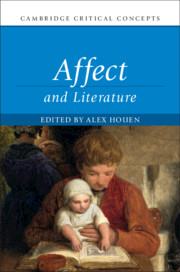Book contents
- Affect and Literature
- Cambridge Critical Concepts
- Affect and Literature
- Copyright page
- Contents
- Notes on Contributors
- Introduction
- I Origins
- Chapter 1 Poetic Fear-Related Affects and Society in Greco-Roman Antiquity
- Chapter 2 Secondary Affect in Lessing, Mendelssohn, and Nicolai
- Chapter 3 Affect and Life in Spinoza, Nietzsche, and Bergson
- Chapter 4 Feelings under the Microscope: New Critical Affect
- Chapter 5 ‘We Manufacture Fun’: Capital and the Production of Affect
- Chapter 6 Jacques Lacan’s Evanescent Affects
- Chapter 7 The Durability of Affect and the Ageing of Gay Male Queer Theory
- Chapter 8 Affect, Meaning, Becoming, and Power: Massumi, Spinoza, Deleuze, and Neuroscience
- Chapter 9 Translating Postcolonial Affect
- Chapter 10 Making Sorrow Sweet: Emotion and Empathy in the Experience of Fiction
- II Developments
- III Applications
- Index
Chapter 10 - Making Sorrow Sweet: Emotion and Empathy in the Experience of Fiction
from I - Origins
Published online by Cambridge University Press: 16 January 2020
- Affect and Literature
- Cambridge Critical Concepts
- Affect and Literature
- Copyright page
- Contents
- Notes on Contributors
- Introduction
- I Origins
- Chapter 1 Poetic Fear-Related Affects and Society in Greco-Roman Antiquity
- Chapter 2 Secondary Affect in Lessing, Mendelssohn, and Nicolai
- Chapter 3 Affect and Life in Spinoza, Nietzsche, and Bergson
- Chapter 4 Feelings under the Microscope: New Critical Affect
- Chapter 5 ‘We Manufacture Fun’: Capital and the Production of Affect
- Chapter 6 Jacques Lacan’s Evanescent Affects
- Chapter 7 The Durability of Affect and the Ageing of Gay Male Queer Theory
- Chapter 8 Affect, Meaning, Becoming, and Power: Massumi, Spinoza, Deleuze, and Neuroscience
- Chapter 9 Translating Postcolonial Affect
- Chapter 10 Making Sorrow Sweet: Emotion and Empathy in the Experience of Fiction
- II Developments
- III Applications
- Index
Summary
The nature and consequences of readers’ affective engagement with literature has, in recent years, captured the attention of experimental psychologists and philosophers alike. Psychological studies have focused principally on the causal mechanisms explaining our affective interactions with fictions, prescinding from questions concerning their rational justifiability. Transportation Theory, for instance, has sought to map out the mechanisms the reader tracks the narrative experientially, mirroring its descriptions through first-personal perceptual imaginings, affective and motor responses and even evaluative beliefs. Analytical philosophers, by contrast, have largely focussed on the problems fiction poses for traditional theories of rationality (as in the ‘Paradox of Fiction), challenging fiction’s wider epistemic value. The result has been a theoretical impasse in which the power of fiction to affectively ‘transport’ a reader is at once often lauded (by psychologists) as a privileged route to interpersonal understanding, and condemned (by philosophers) as an abdication of the authority of reason. This chapter surveys some of the central claims on both sides, tracing the source of the debate to competing conceptions of rationality.
Keywords
- Type
- Chapter
- Information
- Affect and Literature , pp. 190 - 210Publisher: Cambridge University PressPrint publication year: 2020

